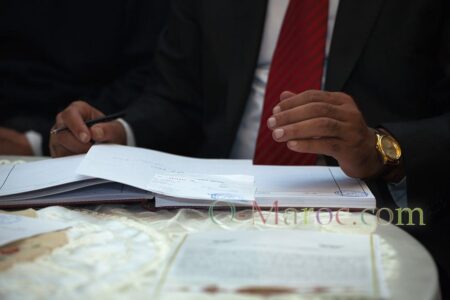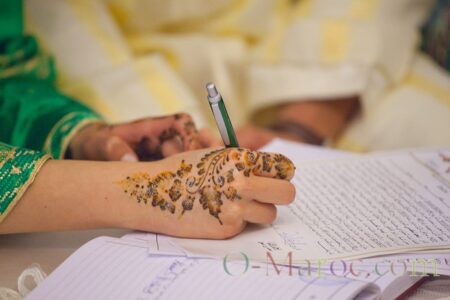The marriage contract may give the wife additional rights over and above normal law, in particular to travel with her children, or to refuse a second wife in advance.
The importance of a marriage contract in Morocco
The form of Moroccan (Muslim) marriage is very different from that of western/secular marriage. It is exclusively a religious marriage, which is materialised by signing the marriage contract before two adouls, the equivalent of notaries, but religious. Civil registration (which goes through the court in Morocco) is an additional formality.
There is no ‘town hall’ in Morocco; the marriage takes place when the contract is signed before the adouls. (The equivalent exists for Jews, who have their own judicial system for all matters relating to personal status. But not for other religions, which means that it is impossible for two Christians, one of whom is Moroccan, to marry in Morocco.)
This marriage contract is ԁrаwn uр in Arabic, subject to very strict formal requirements and must, of course, comply with Muslim and Moroccan law. It would be a mistake to neglect it, or to treat it as a simple ‘formality’ similar to signing at the town hall.
It is in fact possible to include additional clauses, mainly what is permitted to the wife, which may be of great importance in the future, or simply if you are going to live in another Muslim country that is less liberal than Morocco.
It is also strongly recommended that you supplement it with a marriage contract under the law of your home country, which, in any case in France or any country with a system of prenuptial agreement, must be signed before the wedding.
This is in fact the only way for a mixed couple to opt for the regime of ѕераrаtіоn оf рrореrtу (the only legal one under Muslim law), which is not the default matrimonial regime in most Western countries.
(Nb: we are talking here, of course, about legal marriage in Morocco, which excludes so-called “customary” or “fatiha” marriage, without civil registration or contract, taking place before an imam and witnesses. The latter marriage, which is valid in the eyes of the clergy, has had no legal value in Morocco since 2004, and can no longer be regularised).
Moroccan marriage contracts are based on the separation of property. The dowry (mahr or sadaq) is an obligatory gift from the man that belongs solely to the woman.
Your marriage contract may include clauses that comply with the law of your country, as long as they do not conflict with Moroccan law. Here's how it works internationally.



